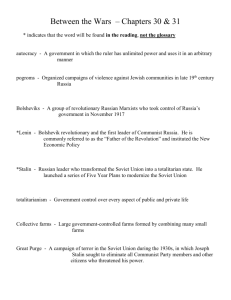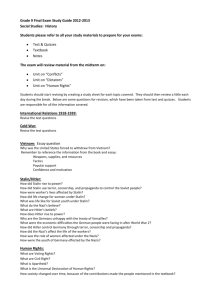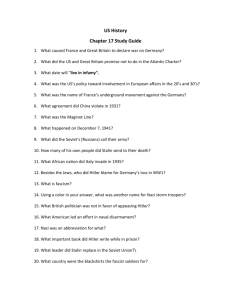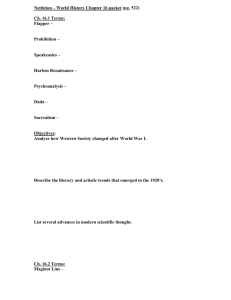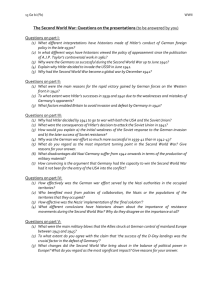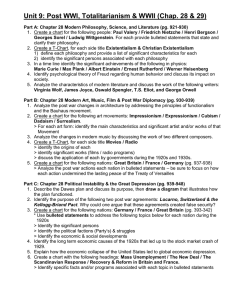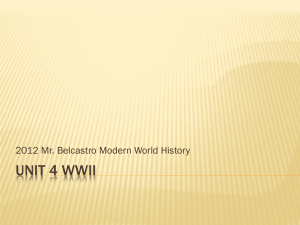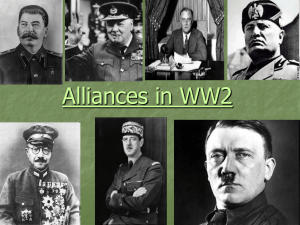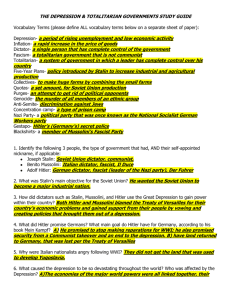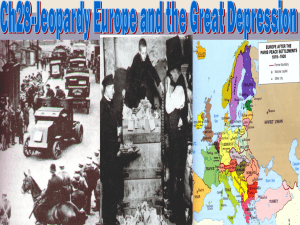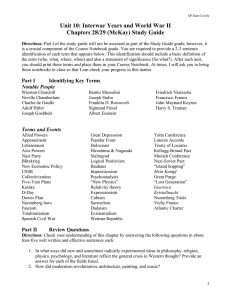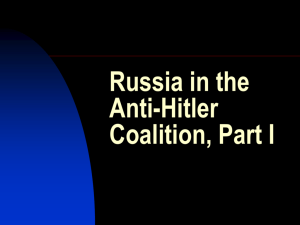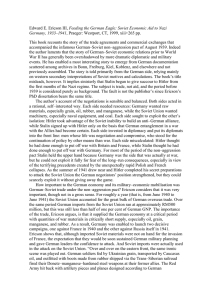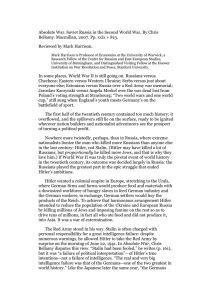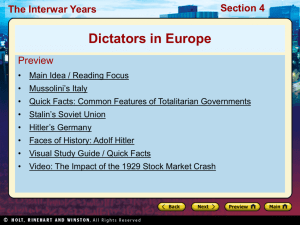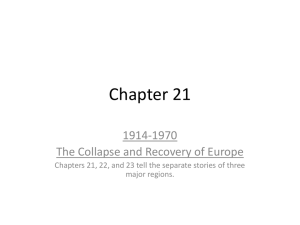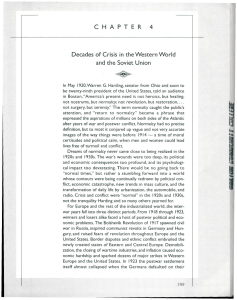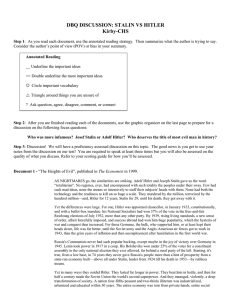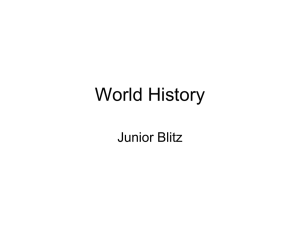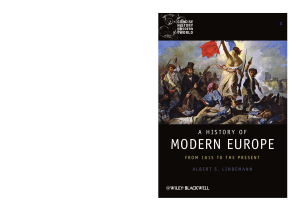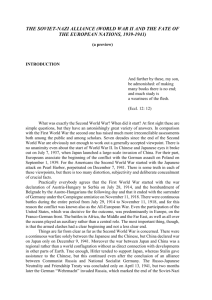Bell Ringer - misshardershistory
advertisement
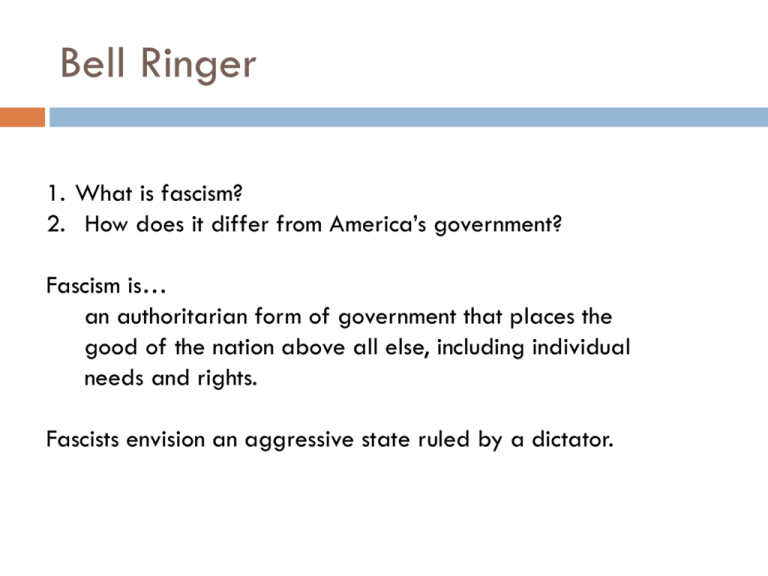
Bell Ringer 1. What is fascism? 2. How does it differ from America’s government? Fascism is… an authoritarian form of government that places the good of the nation above all else, including individual needs and rights. Fascists envision an aggressive state ruled by a dictator. WWII The Beginning: Facism Mussolini’s Italy • founded the National Fascists Party in 1919, quickly gained power • Mussolini marched on Rome and took power from the Italian king in 1922 • wanted control of all aspects of life—totalitarianism • appealed to the people through his use of propaganda and establishment of new festivals and holidays to remind modern Italians of their proud Roman heritage Mussolini’s Italy • wanted Italy to become a strong military power so he invaded Ethiopia • Ethiopians leader Haile Selassie appealed to the League of Nations to take action against Italian aggression, but they did not want another world war Stalin’s Soviet Union wanted to strengthen Communism by turning to Soviet Union into a totalitarian state, intent on controlling every aspect of Soviet life Stalin’s Soviet Union FIVE-YEAR PLANS “The fundamental task of the five-year plan was to… …transfer our country, with its backward…technology, on to the lines of new, modern technology. …convert the U.S.S.R. from an agrarian and weak country…into an industrial and powerful country. …ensure the economic basis of socialism in the countryside and thus eliminate the possibility of the restoration of capitalism in the U.S.S.R. -the state set factory and mine production goals -during the first two Five-Year Plans, oil production more than doubled and coal and steel production quadrupled Stalin’s Soviet Union Collectivization—wanted to increase farm output so he combined thousands of small farms into larger, mechanized farms -peasants that resisted were either executed or sent to labor camps called the Gulag. - the Gulag was in Siberia, a remote and frigid region of the Soviet Union - resistance was very strong in Ukraine, so when famine struck in 1932, Stalin refused to send food to aid them Stalin’s Soviet Union -By the mid-1930s, Stalin had absolute power but still feared that people were plotting against him - Great Terror: series of purges that attacked real and imagined opponents of Stalin’s rule -Stalin’s regime dominated Soviet life • children were encouraged to join youth organizations •religion was discouraged and churches were closed • portraits of Stalin decorated public places all over Russia • streets and towns were renamed in his honor Hitler’s Germany -born in Austria in 1889, served in the German army during WWI -during the chaos of post-war Germany, he became involved with a group of right-wing extremists and joined the Nationalist Socialist party, or Nazi Party - due to his talent for public speaking and leadership, he quickly became a key figure in this party - October 1923: led a failed attempt to overthrow government and received a short prison term Hitler’s Germany Mein Kampf or “My struggle” described Hitler’s major political ideas, including nationalism and the racial superiority of the German people, whom he called Aryans “…the black-haired Jewish youth lies in wait for hours on end, satanically glaring at and spying on the unsuspicious girl whom he plans to seduce, adulterating her blood and removing her from the bosom of her own people. The Jew uses every possible means to undermine the racial foundations of a subjugated people.” “...the personification of the devil as the symbol of all evil assumes the living shape of the Jew.” Hitler’s Germany -due to problems created by Treaty of Versailles and the Great Depression, the German people were desperate - Hitler promised to rebuild the German military and he spoke of a mighty German empire, declaring that Germans were the “master race” - these claims and promises won Nazi Party many new supporters - Hitler was named chancellor in 1933 (most powerful post in German government) Hitler’s Germany -Hitler’s rule took the form of a totalitarian regime • crushed opposition—arrests and intimidation by Nazi thugs • bullied German legislature • used propaganda to glorify himself as the great Fuhrer or “leader” • created Nazi youth organizations to shape the minds of young Germans -began to rebuild German military and improve the economy - set wage controls and began massive government spending on public works programs Hitler’s Germany -Nazi Anti-Semitism: hostility/prejudice toward Jews - blamed Jews for Germany’s problems - Nuremburg Laws: created a separate legal status for German Jews, eliminating their citizenship and many civil and property rights such as the right to vote -Kristallnacht: Night of Broken Glass • anti-Jewish riots were encouraged across Germany and Austria • nearly 100 Jews were killed and thousands of Jewish businesses and places of worship were destroyed
